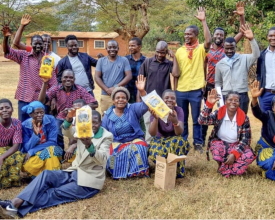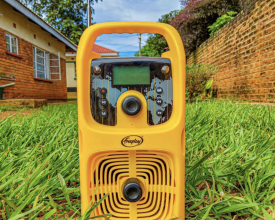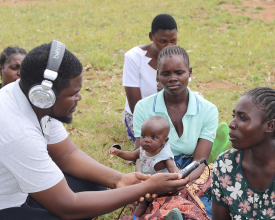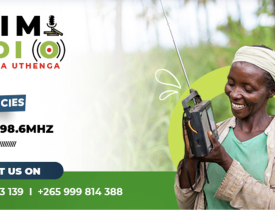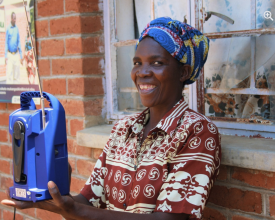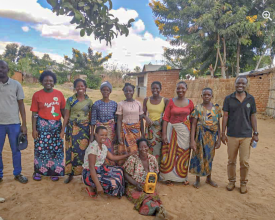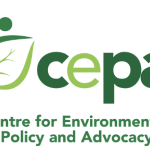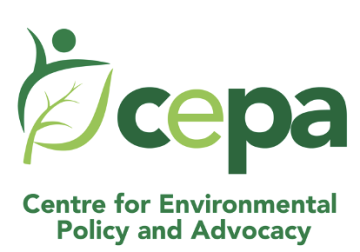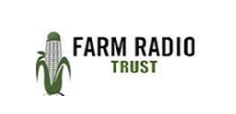
FARM AND COMMUNITY RADIOS FOR IMPROVED PEER TO PEER LEARNING ON FOREST AND LANDSCAPE RESTORATION
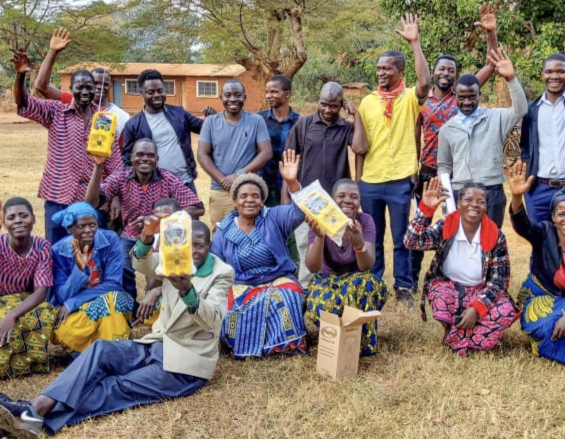
Farm Radio Trust (FRT) is a Malawian NGO dedicated to improving smallholder farmers’ access to agricultural information through radio and ICT-based platforms. In rural areas where formal extension services are limited, radio remains a trusted source of knowledge. FRT uses this medium—alongside mobile and digital tools—to deliver inclusive, accurate, and locally relevant extension and advisory services. We bridge the gap between farmers and extension worker ratio and reach to a wider community, scaling out agriculture innovations.
The Solution addresses the lack of access to reliable agricultural information among men, women, and youth farmers. It increases awareness and adoption of climate-resilient and productivity-enhancing practices by making information accessible and understandable. FRT also supports policy integration of ICT in extension systems and promotes the use of market linkage platforms, improving farmers’ access to inputs, services, and markets, and strengthening agricultural value chains.
Contexte
Challenges addressed
Smallholder farmers in Malawi face multiple challenges that hinder productivity and resilience. Environmentally, they struggle with limited access to reliable information on climate-resilient practices, leaving them vulnerable to climate change and land degradation. Socially, many farmers—especially women and youth—lack access to inclusive, timely, and understandable extension services. Economically, poor market information and limited advisory support reduce productivity and income opportunities.
The Solution responds to these challenges by using radio and ICTs to bridge information gaps, promote farmer participation, and strengthen advisory services. It also advocates for policies that enhance access to agricultural information and supports collaboration to scale up impact.
Emplacement
Traiter
Summary of the process
The success of the solution lies in how its components are strategically connected and reinforce one another. Building farmer awareness and skills through inclusive, ICT-enabled extension services creates a strong foundation for understanding and adopting new, context-specific technologies. These technologies—selected for their practicality and relevance—offer tangible benefits that motivate farmers to act on the information received. Policy advocacy ensures these ICT-based approaches are institutionalized, providing long-term support and scalability of extension services. Meanwhile, improved access to market linkages completes the cycle by turning increased knowledge and production into economic opportunity. Together, these elements form an integrated approach where knowledge leads to action, action is supported by policy, and outcomes are sustained by better market access.
Building Blocks
Enhancing Farmer Knowledge through Inclusive Extension Services
- Increasing awareness, knowledge and skills of adult and youth male and female SHFs in agriculture extension through provision of comprehensive information on Agriculture extension and advisory services. By delivering accurate, relevant, and timely information via radio and other ICT platforms, the initiative empowers farmers with practical knowledge on sustainable agriculture, climate-resilient practices, and improved farm management. It ensures inclusivity by targeting both men and women, including youth, fostering informed decision-making, productivity, and resilience in farming communities.
Promoting Adoption of Agricultural Technologies
It is key to ensure that information about new technologies is accessible, practical, and relevant to local contexts.
Key technologies promoted include drip irrigation for tomatoes, which helps farmers conserve water and increase yields; soil rejuvenation using Mucuna, a leguminous cover crop that improves soil fertility; and onion nursery establishment and disease control, which supports healthier crop development.
Other examples include nematode management in vegetable crops to reduce pest-related losses, and home-based chick rearing to support income generation for women and youth. These technologies are selected for their practicality, affordability, and relevance, and are shared through participatory radio programs, SMS alerts, and community ICT hubs.
Special attention is given to addressing gender and age-related barriers to adoption, ensuring that all groups have equal opportunities to benefit.
Enabling ICT-Driven Agricultural Extension Through Policy Support
This intervention aims to establish a conducive policy environment for the integration of ICTs—such as radio, mobile phones, and digital tools—into agricultural extension and advisory services. Many smallholder farmers in Malawi face challenges accessing timely and relevant agricultural information. By advocating for ICT-based approaches within national policies and working closely with stakeholders and government institutions, the initiative promotes long-term institutional support and sustainability of these services. It ensures that ICT-enhanced extension is formally recognized, funded, and embedded within agricultural strategies, ultimately expanding the reach and impact of extension services for men, women, and youth farmers.
Expanding Market Access Through Digital and Physical Linkages
This component focuses on increasing the use of digital and physical market linkage platforms by male and female adult and youth smallholder farmers. Limited access to markets, pricing information, and quality inputs remains a barrier to productivity and income generation. By leveraging ICT tools, the initiative helps farmers connect to buyers, suppliers, and service providers more efficiently. It strengthens their participation in the agricultural value chain, enhances transparency, and improves decision-making. As a result, farmers are better positioned to sell their produce at competitive prices, access affordable inputs, and increase their resilience to market shocks.
Impacts
There are strong environmental, social, and economic impacts across Malawi coming from this solutions. Over 1 million smallholder farmers, including women and youth, have gained access to accurate, inclusive agricultural information via radio, SMS, and ICT hubs. This has enhanced knowledge, decision-making, and adoption of climate-smart technologies like drip irrigation, Mucuna cover cropping, nematode control, and home-based poultry. These practices have led to 25–35% increases in yields, reduced pesticide use, and improved soil health. The project trained hundreds of extension workers in ICT tools, boosting outreach to rural farmers. It also influenced national policy to support and fund ICT-based agricultural extension services.
Socially, the projects strengthened community resilience and empowered marginalized groups, with 34% of beneficiaries being female-headed households and 43% youth-headed. Economically, access to digital market platforms improved incomes and reduced vulnerability to shocks.
Environmentally, the promotion of sustainable practices and natural regeneration has contributed to forest and landscape restoration, reduced land degradation, and enhanced biodiversity. Together, these impacts support more resilient farming systems and healthier ecosystems.
Beneficiaries
Over 1 million farmers, including 34% female-headed and 43% youth-led households. The projects also trained hundreds of extension workers, enhancing their capacity to deliver ICT-based advisory services to rural communities.
Global Biodiversity Framework (GBF)
Sustainable Development Goals
Story
PRISE–FRT Pest Management Campaign
In late 2020, the PRISE program, in partnership with Farm Radio Trust, launched a 10-week radio and SMS pest alert campaign targeting maize, tomato, and bean farmers in Mchinji and Balaka districts. Leveraging weekly broadcasts on local radio and over 461,000 SMS messages sent to more than 1,200 farmers, the campaign shared pest-risk forecasts and Integrated Pest Management (IPM) advice tailored to current local conditions.
A linked call center—staffed by Plantwise “Plant Doctors”—handled farmer inquiries and collected feedback. Results from a Knowledge, Attitudes & Practices survey showed:
- 60% of farmers tuned in to the broadcasts, and all understood the content.
- 95% found the SMS messages easy to understand, with 72% acknowledging that these messages directly helped them manage pests
This targeted, multi-channel intervention led to improved pest control practices, reduced crop losses, and strengthened resilience—demonstrating the power of radio + ICTs in delivering real, measurable impact to smallholder farmers.

